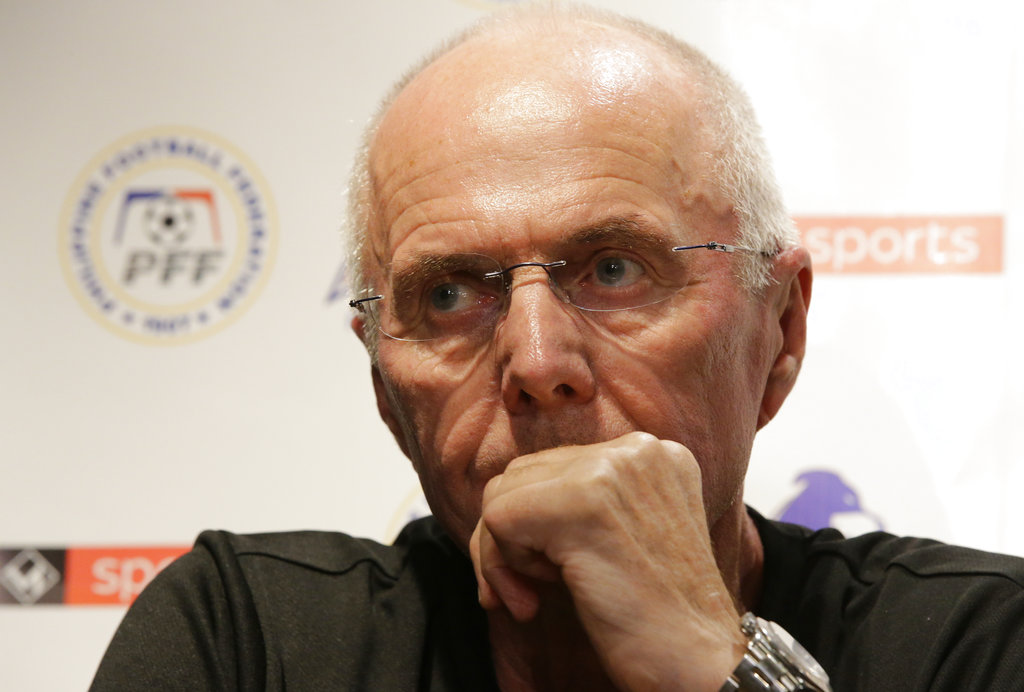
FILE – In this Nov. 5, 2018, file photo, Philippines national football team’s new head coach Sven-Goran Eriksson attends a press conference in metropolitan Manila, Philippines. Two decades ago, Sven-Goran Eriksson and Marcello Lippi coached against each other in the Italian league. The famous tacticians are just two of a number of high-profile international coaches preparing for the 2019 Asian Cup that kicks off in Abu Dhabi on Saturday, Jan. 5, 2019. (AP Photo/Aaron Favila, File)
ABU DHABI, United Arab Emirates — Sven-Goran Eriksson and Marcello Lippi coached against each other in the Italian league more than 20 years ago. The famous tacticians are just two of a number of high-profile international coaches preparing for the 2019 Asian Cup that begins in Abu Dhabi on Saturday.
The tournament, expanded from 16 teams in 2015 to 24 teams in the United Arab Emirates, is the biggest ever. It remains to be seen if the competition, with venues also in Dubai, Sharjah and Al Ain, is the best.
For the likes of Eriksson, in charge of the Philippines, or Lippi and China, success is not necessarily about winning the trophy. Eriksson, appointed in October, would simply like to survive the group stage in the country’s first appearance in the competition.
“I think at this Asian Cup, with this generation of players, the Philippines have the chance to show that football is good in the Philippines and qualifying for the Asian Cup will help,” said Eriksson, who took England to the quarterfinals of the World Cup in 2002 and 2006.
“If we can go through that will mean a lot for the country.”
For Lippi, coming to the end of an disappointing two-year spell in charge of China, success would be any sign that the country, still to win the Asian Cup, had made progress.
As it stands however, the team enters the tournament with just one win in its last seven games, a run that includes disappointing draws against Palestine, India and Bahrain.
“The players have performed well in the training camp we had,” Lippi, expected to retire after the tournament ends, said.
Host UAE has another high-profile Italian coach with performances under Alberto Zaccheroni disappointing. Zaccheroni took AC Milan to the 1999 Serie A title but in 11 games in 2018, the UAE, 1996 finalists, scored just seven goals.
Regional rival Saudi Arabia has been in better form under Argentine coach Juan Antonio Pizzi, who led Chile to the 2016 Copa America title. Compatriot Hector Cuper has been appointed by Uzbekistan.
Former Real Madrid and Portugal boss Carlos Queiroz has genuine hopes of winning with Iran, Asia’s top-ranked team according to FIFA. Queiroz has been in charge since 2011 and is the longest-serving coach in the tournament.
Australia, South Korea and Japan are also expected to be in the running for the final that takes places on Feb. 1 in Abu Dhabi.
Australia is defending champion after winning the 2015 edition at home although the Socceroos will be without European-based stars such as Mathew Leckie and Aaron Mooy. South Korea, led by former Portugal boss Paulo Bento, also has injury issues but possesses the biggest name in Asian soccer in Son Heung-min.
The in-form Tottenham Hotspur attacker will miss the first two group games and arrive in time to take on China on Jan. 16, although he has apologized to the club for leaving mid-season.
“I feel sorry for my teammates, the fans and the coaching staff,” Son said. “It’s difficult. Sometimes you think it’s a bit sad, but it is also important for my country. I hope I can keep my form for the national team and when I come back here again as well.”
Japan, one of the few countries with a domestic coach in Hajime Moriyasu, was Asia’s most successful team at the 2018 World Cup and is also considered to be a front-runner.
Some talking points:
EXPANSION
Increasing the number of participants from 16 to 24 has opened the door for new teams such as Kyrgyzstan, the Philippines and Yemen. It also means that only eight teams will be eliminated in the group stage with 16 progressing to the second round.
POLITICS
Never far from the surface in Asian soccer. United Arab Emirates, Bahrain and Saudi Arabia broke off diplomatic relations with Qatar in 2016. Saudi Arabia and Qatar, 2022 World Cup host, meet in the group stage and while clubs from the countries have met in the Asian Champions League, tensions are likely. There is also a chance of South and North Korea, technically still at war, meeting in the knockout stage.
CONFLICT
Both Yemen and Syria have a chance to make some international headlines that do not involve the ongoing conflict taking place at home. Soccer continues to survive and Syria especially has ambitions of progressing to the last eight and perhaps beyond.